
A central bank, reserve bank, national bank, or monetary authority is an institution that manages the currency and monetary policy of a country or monetary union. In contrast to a commercial bank, a central bank possesses a monopoly on increasing the monetary base. Many central banks also have supervisory or regulatory powers to ensure the stability of commercial banks in their jurisdiction, to prevent bank runs, and in some cases also to enforce policies on financial consumer protection and against bank fraud, money laundering, or terrorism financing. Central banks play a crucial role in macroeconomic forecasting, which is essential for guiding monetary policy decisions, especially during times of economic turbulence.

The Federal Reserve Act was passed by the 63rd United States Congress and signed into law by President Woodrow Wilson on December 23, 1913. The law created the Federal Reserve System, the central banking system of the United States.
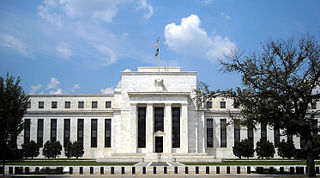
The monetary policy of the United States is the set of policies which the Federal Reserve follows to achieve its twin objectives of high employment and stable inflation.

The Bank of Korea is the central bank of South Korea and issuer of South Korean won. It was established on 12 June 1950 in Seoul, South Korea.

The Bangko Sentral ng Pilipinas is the central bank of the Philippines. It was established on January 3, 1949, and then re-established on July 3, 1993 pursuant to the provision of Republic Act 7653 or the New Central Bank Act of 1993 as amended by Republic Act 11211 or the New Central Bank Act of 2019. The principal author was Senator Franklin Drilon. It was signed by President Rodrigo Duterte.
Bank rate, also known as discount rate in American English, and (familiarly) the base rate in British English, is the rate of interest which a central bank charges on its loans and advances to a commercial bank. The bank rate is known by a number of different terms depending on the country, and has changed over time in some countries as the mechanisms used to manage the rate have changed.
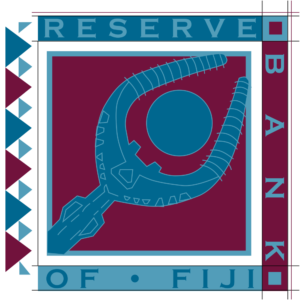
The Reserve Bank of Fiji is the central bank of the Pacific island country of Fiji. Its responsibilities include the issue of currency, control of the money supply, currency exchange, monetary stability, promotion of sound finances, and fostering economic development.

The Central Bank of Nigeria (CBN) is the central bank and apex monetary authority of Nigeria established by the CBN Act of 1958 and commenced operations on 1 July 1959. The major regulatory objectives of the bank as stated in the CBN Act are to: maintain the external reserves of the country; promote monetary stability and a sound financial environment, and act as a banker of last resort and financial adviser to the federal government. The central bank's role as lender of last resort and adviser to the federal government has sometimes pushed it into murky political controversies. After the end of colonial rule, the desire of the government to become proactive in the development of the economy became visible, especially after the end of the Nigerian civil war, the bank followed the government's desire and took a determined effort to supplement any show shortfalls, credit allocations to the real sector. The bank became involved in lending directly to consumers, contravening its original intention to work through commercial banks in activities involving consumer lending.

The Central Bank of Armenia is the central bank of Armenia with its headquarters in Yerevan. The CBA is an independent institution responsible for issuing all banknotes and coins in the country, overseeing and regulating the banking sector and keeping the government's currency reserves. The CBA is also the sole owner of the Armenian Mint.
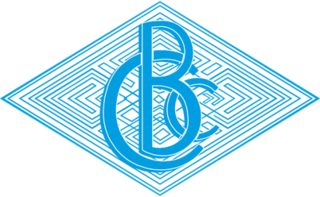
The Central Bank of the Congo, colloquially known by its acronym BCC, is the central bank of the Democratic Republic of the Congo. Its headquarters are located on Boulevard Colonel Tshatshi in Gombe, Kinshasa, surrounded by significant institutions including the Palais de la Nation, the National Library, and several government ministries.
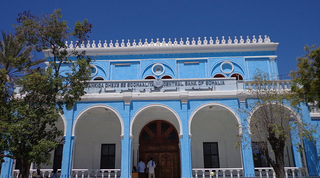
The Central Bank of Somalia (CBS) is the monetary authority of Somalia. Somalia has struggled to reestablish a functioning state since the collapse of an authoritarian regime in 1991. Somalia has been cited as a real-world example of an anarchist stateless society and a country with no formal legal system. The Transitional Federal Government, formed in 2004, was recognized as the central government of Somalia. Among other duties, it is in charge of ensuring financial stability, maintaining the internal and external value of the local currency, and promoting credit and exchange conditions that facilitate the balanced growth of the national economy. Within the scope of its powers, it also contributes to the financial and economic policies of the State.

The Central Bank of the United Arab Emirates is the state institution responsible for managing the currency, monetary policy, banking and insurance regulation in the United Arab Emirates.
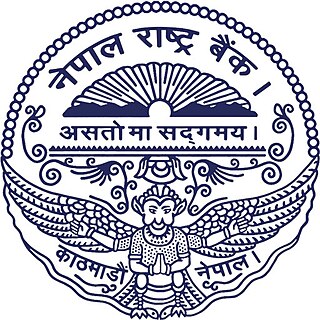
The Nepal Rastra Bank was established on April 26, 1956 A.D. under the Nepal Rastra Bank Act, 1955, to discharge the central banking responsibilities including guiding the development of the embryonic domestic financial sector. The NRB is functioning under the new Nepal Rastra Bank Act, 2002. The functions of NRB are to formulate required monetary and foreign exchange policies so as to maintain the stability in market prices, to issue currency notes, to regulate and supervise the banking and financial sector, to develop efficient payment and banking systems among others. The NRB is also the economic advisor to the government of Nepal. As the central bank of Nepal, it is the monetary, supervisory and regulatory body of all the commercial banks. development banks, finance companies and micro-finances institutions.

The Palestine Monetary Authority is the emerging central bank of Palestine. The PMA, located in Ramallah, was established in 1994 following the signing of the Protocol on Economic Relations between the Palestinians and Israel. It is an independent public institution responsible for the formulation and implementation of monetary and banking policies, to safeguard the banking sector and to ensure the growth of the national economy in a balanced manner.
The Finance system in Azerbaijan consists of government policy and arrangements for borrowing and lending and the transfer of assets. The system is composed of banks, insurance companies, other financial institutions, pension system, financial markets and payment systems.

The House Committee on Finance is a standing committee of the House of Representatives in Nigeria. The committee is responsible for overseeing financial matters in the country, including revenue generation, budget planning, and fiscal policies.

The House Committee on Basic Education and Services is a standing committee of the Nigerian House of Representatives, responsible for legislative oversight and advancing basic education policies in Nigeria. Working alongside its Senate counterpart, the committee ensures effective implementation of education programs and regulatory frameworks. Its oversight extends to agencies such as the Universal Basic Education Commission (UBEC) and the Federal Ministry of Education, making it an influential body in shaping Nigeria's education sector.

The House Committee on Communications is a standing committee of the Nigerian National Assembly tasked with legislative oversight of the communications sector, including telecommunications, information technology, and digital economy policies.

The House Committee on Health was established by the Federal Government of Nigeria under the provisions of legislative decrees to oversee the nation's health institutions and ensure effective healthcare delivery. Tasked with legislative oversight, the committee evaluates the performance of health facilities, formulates policies to enhance healthcare services, and collaborates with stakeholders to strengthen Nigeria's healthcare system. Its mandate includes ensuring adequate funding for health institutions, monitoring infrastructure development, and promoting initiatives to improve public health outcomes nationwide.














